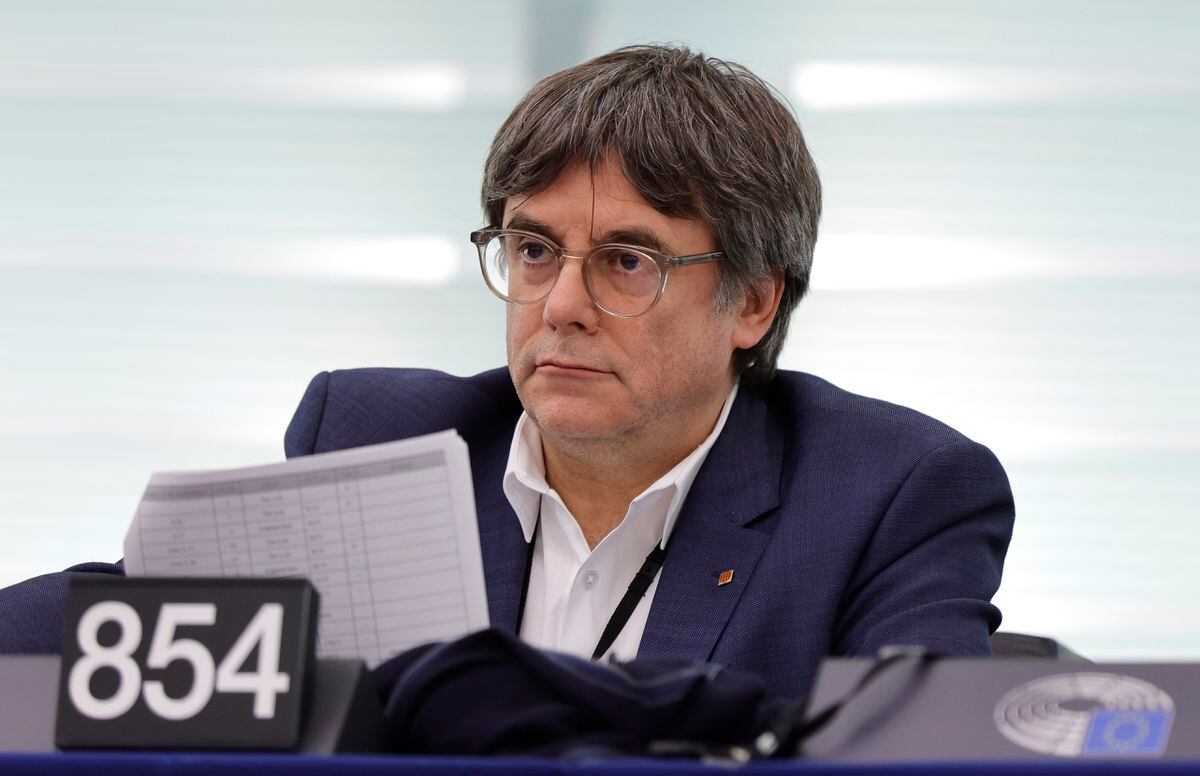The president of the ERC, Oriol Junqueras, intervenes in the act entitled "Four years of exile. Amnesty and free return!", this Tuesday in Barcelona. Quique García (EFE)
The Constitutional Court rejected this Wednesday by six votes against three the amparo appeal filed by the former Vice President of the Generalitat of Catalonia Oriol Junqueras, and the
former
Minister of Foreign Affairs Raül Romeva, against the Supreme Court ruling that sentenced them to 13 and 12 years of prison respectively for sedition and embezzlement in the
procés trial
.
The court of guarantees rejects the thesis that the Supreme Court would have had to recognize in Junqueras the prerogative of immunity, as an elected MEP, and not pass judgment until the Court of Justice of the European Union had ruled.
This aspect of the Constitutional ruling has been the most debated in this appeal, which together with those of Joaquim Forn
—former
Minister of the Interior— and Dolors Bassa —of Labor— close the long chapter of resolutions on the Catalan independence process.
The private votes announced by the vice president of the court, Juan Antonio Xiol, and by the magistrates Ramón Sáez and María Luisa Balaguer —the three of the progressive minority— are based on the fact that the sentences imposed were disproportionate.
They also question the administration of the times that allowed the Supreme Court to pass judgment on Junqueras without waiting for the ruling of the EU Court of Justice.
Junqueras' lawyer, Andreu Van den Eynde, is going to appeal to the European Court of Human Rights (ECHR).
It will be based, among other things, on the fact that the Supreme Court did not duly recognize the prerogative of immunity of the ERC leader after being elected MEP in the elections to the European Parliament in May 2019. And this is because the Supreme Court raised its doubts about this point in a preliminary ruling before the Court of Justice of the EU, and delivered its judgment without waiting for a response from Luxembourg.
The answer to such doubts was that the immunity had operated since the proclamation of the results of the May 2019 elections. When this clarification arrived, on December 19 of the same year, Junqueras had already been sentenced by the Supreme Court, on October 14 previous.
For the six magistrates who rejected Junqueras' appeal, the Supreme Court's procedure was correct.
His thesis is that immunity protects the parliamentarian from any prosecution, but Junqueras should not be recognized because when he was elected MEP he had already been prosecuted and the oral trial in which he was tried for the alleged crime of rebellion was underway.
The controversy arose when Junqueras asked to be released to travel to Brussels and take office as an MEP.
The speaker of the sentence is the president of the Constitutional Court, Pedro González-Trevijano, whose opinion has been shared by the magistrates Ricardo Enríquez, Santiago Martínez Vares, Concepción Espejel and Enrique Arnaldo, of the conservative majority, and the also magistrate Inmaculada Montalbán, of the progressive minority.
The also magistrates Cándido Conde-Pumpido and Antonio Narváez —progressive and conservative, respectively— have not participated in the debates, since they abstained after being challenged, for having made demonstrations about the
procés
.
The resolution on Junqueras and Romeva is the most voluminous that of the court on the
procés
, since it reaches almost six hundred pages.
In them, other issues on which it has doctrine are addressed, used to reject the violation of fundamental rights in aspects such as the presumption of innocence, access to the judge predetermined by law, double criminal instance, parliamentary inviolability or the principle of criminal legality, which implies that no one will be sentenced for conduct that is not provided for by law.
All this will now be raised again in his appeals before the European Court of Human Rights.




/cloudfront-eu-central-1.images.arcpublishing.com/prisa/6J6IDFNANBHZTA3MY5WEEPZLW4.jpg)



